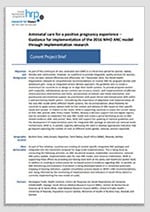Global Early Adolescent Study

Overview
The ages 10 to 14 are among the most critical for human development, yet one of the most poorly understood stages of the life course. While biological processes are universal, the social contexts within which they occur vary considerably. Across early adolescence, young people are expected to assume socially defined gender roles that shape their sexual and reproductive health future.
Objective: The Global Early Adolescent Study (GEAS) aims to understand the factors in early adolescence that predispose young people to subsequent sexual health risks and promote healthy sexuality, so as to provide the information needed to promote sexual and reproductive well-being. In some sites, it is used alongside an intervention to assess impact. Specifically, the GEAS explores how young adolescents:
- Perceive norms regulating both romantic and platonic relationships between boys and girls;
- Form normative beliefs about gender;
- Reconcile these individual beliefs with social norms in their communities and contexts;
- Regulate their behaviours as a result of gender norms.
